Omega-3s and Cortisol: Fighting Inflammation Naturally
Introduction
You’ve probably heard that omega-3 fatty acids are good for your heart, your brain, and even your mood. But what’s less known — and far more fascinating — is how they affect cortisol, your body’s main stress hormone.
When stress becomes chronic, cortisol levels stay elevated for too long, triggering inflammation, fatigue, and even stubborn belly fat. Omega-3s help interrupt that cycle. They don’t just reduce inflammation — they help your body recover from stress on a cellular level.
Let’s explore how these remarkable fats calm the nervous system, regulate hormones, and restore balance in a world where stress is constant. 🌸
Looking for supplements for This? Click here.
🌞 Understanding Cortisol and Chronic Inflammation

Cortisol’s job is to help you survive. When danger appears — physical or emotional — cortisol floods your bloodstream, mobilizing glucose and sharpening focus.
Short term, this is protective. Long term, it’s destructive.
When cortisol remains high, your immune system becomes overactive, releasing inflammatory molecules called cytokines. These, in turn, tell your brain and adrenal glands to produce even more cortisol.
It’s a feedback loop — stress → inflammation → more stress.
That’s where omega-3s come in. They act like mediators, quietly switching off this biochemical alarm system and helping your body return to equilibrium. 🌿
🌿 What Are Omega-3 Fatty Acids?
Omega-3s are essential polyunsaturated fatty acids (PUFAs) — meaning your body can’t make them, so you have to get them through food or supplements.
The three main types are:
ALA (alpha-linolenic acid): Found in flaxseed, chia, and walnuts.
EPA (eicosapentaenoic acid): Found in fish oils; anti-inflammatory and cortisol-modulating.
DHA (docosahexaenoic acid): Supports brain health, cell membranes, and mood stability.
EPA and DHA are the true therapeutic forms. They integrate into every cell membrane in your body, making them flexible and responsive — key for reducing inflammation and stabilizing stress hormones. 🌸
🌙 How Omega-3s Help Regulate Cortisol
Dampening the Stress Response
Your HPA axis (hypothalamic-pituitary-adrenal system) controls how much cortisol you release. Chronic stress makes it hyper-reactive.
Omega-3s help normalize this system. Studies show people with higher omega-3 intake produce less cortisol during stressful tasks than those deficient in these fats.
Improving Cell Membrane Function
Every hormone receptor — including cortisol receptors — sits on a cell membrane made largely of fat. Omega-3s make those membranes more fluid and efficient, allowing better hormone signaling and reducing “resistance” to feedback loops.
Reducing Cortisol-Driven Inflammation
Excess cortisol raises pro-inflammatory cytokines like IL-6 and TNF-α. Omega-3s directly counteract these through specialized molecules called resolvins and protectins — compounds that literally resolve inflammation.
Enhancing Parasympathetic Recovery
Omega-3s improve heart-rate variability (HRV), a key marker of relaxation. That means your body can return to calm more quickly after stress. 🌿
🌞 The Science of Omega-3s and Stress
Several clinical studies reveal how omega-3s regulate both cortisol and inflammation:
Participants supplementing with 2.5 g/day of EPA + DHA for 12 weeks showed a 19% reduction in cortisol during stressful events.
Omega-3s also reduced markers of inflammation (CRP, IL-6) while improving mood stability and resilience.
In military personnel and medical students under high stress, omega-3 supplementation improved focus and reduced anxiety — clear evidence of HPA-axis normalization.
Science confirms what many people feel: when omega-3 levels rise, stress feels more manageable, recovery comes faster, and emotional stability returns. 🌸
🌿 The Link Between Cortisol, Brain, and Fat
Cortisol affects not only stress but also where and how your body stores energy. Chronic high cortisol encourages fat accumulation in the visceral region — the deep belly area around your organs.
Omega-3s combat this on two fronts:
They lower cortisol peaks, reducing the signal to store energy as fat.
They improve insulin sensitivity, meaning your body uses glucose efficiently instead of converting it to fat.
People with higher omega-3 intake tend to have lower waist circumference and better metabolic flexibility — the ability to switch smoothly between burning carbohydrates and fat for energy. 🌞
🌸 Omega-3s, Cortisol, and the Brain
Chronic stress inflames the brain. It disrupts neurotransmitters, shrinks the hippocampus (the memory center), and impairs neuroplasticity.
DHA, the most abundant omega-3 in the brain, protects neurons by reducing oxidative stress and inflammation.
It also enhances:
Serotonin and dopamine signaling, improving mood.
GABA balance, promoting calm focus.
BDNF (brain-derived neurotrophic factor), which helps repair and grow new neurons.
Omega-3s literally rebuild a calmer, more resilient brain. 🌿
🌙 Cortisol, Omega-3s, and Sleep
High nighttime cortisol disrupts melatonin production, making it hard to fall asleep.
Omega-3s, especially DHA, improve sleep by restoring circadian rhythm and lowering evening stress hormones.
Regular intake can lead to:
Easier sleep onset
Fewer nighttime awakenings
More vivid dreaming (a sign of REM balance)
Sleep quality, in turn, further lowers cortisol — completing a self-reinforcing cycle of recovery. 🌙
Looking for supplements for This? Click here.
🌞 Inflammation: The Silent Driver
Inflammation is the bridge between stress and disease. Chronic low-grade inflammation can quietly damage tissues, age your skin, and disrupt hormones long before symptoms appear.
Omega-3s transform inflammatory signaling pathways:
They replace omega-6 fats in cell membranes, reducing pro-inflammatory eicosanoids.
They produce resolvins that actively turn off inflammation once healing begins.
They improve blood flow, oxygenation, and mitochondrial energy output.
This not only reduces stress-related illness but also enhances energy and focus. 🌿
🌸 The Omega-6/Omega-3 Balance Problem
The modern Western diet contains 10–20× more omega-6 (from vegetable oils, fried foods, processed snacks) than omega-3.
That imbalance drives inflammation and makes cortisol regulation harder.
To regain balance:
Reduce refined seed oils (corn, soy, safflower).
Use olive oil, avocado oil, or coconut oil instead.
Increase fatty fish or algae oil intake several times a week.
Your body’s stress chemistry depends heavily on this ratio — restoring it can transform how you feel. 🌞
🌿 Emotional Resilience and Omega-3s
Cortisol is not just physical — it’s emotional. Chronic stress keeps you hyper-vigilant, reactive, and disconnected from calm.
Omega-3s help re-establish emotional balance by smoothing neural communication in brain regions that regulate fear and mood.
People who take omega-3s consistently often describe:
Feeling calmer under pressure
More stable moods
Fewer energy crashes
Less irritability
This mental steadiness allows for healthier choices — fewer stress snacks, better workouts, deeper rest. 🌸
🌙 Omega-3 Sources: Food vs. Supplements
Food Sources
Fatty fish: salmon, sardines, mackerel, anchovies, herring.
Plant sources: flaxseed, chia, walnuts (ALA form — partially converted).
Supplement Sources
Fish oil capsules (most common)
Krill oil (more bioavailable, includes astaxanthin antioxidant)
Algae oil (vegan DHA + EPA option)
Always choose a brand tested for purity and heavy-metal safety. 🌿
🌞 How Much Omega-3 Do You Need?
Typical recommendations for stress and inflammation support:
General health: 1000 mg combined EPA + DHA daily
Cortisol and mood support: 2000–2500 mg daily
High inflammation or depression: up to 3000 mg (with supervision)
Split the dose between morning and evening for steady absorption.
Consistency is key — omega-3s work by gradually reshaping your cell membranes, a process that takes 4–8 weeks. 🌸
🌿 Combining Omega-3s With Other Cortisol-Balancing Nutrients
Synergy matters. Omega-3s pair beautifully with nutrients that support adrenal and nervous-system recovery:
Magnesium glycinate — calms the nervous system, promotes better sleep.
Vitamin C — protects adrenal tissue, aids cortisol regulation.
B-complex — supports neurotransmitter and energy metabolism.
Ashwagandha or Rhodiola — adaptogens that smooth cortisol spikes.
Phosphatidylserine — lowers nighttime cortisol and improves memory.
Together, they create a biochemical environment of balance — lower stress, better mood, and deeper recovery. 🌿
🌸 Omega-3s and Exercise Recovery

Exercise is healthy stress — but it still raises cortisol temporarily. Omega-3s help your body recover faster by reducing post-workout inflammation and muscle soreness.
They also improve oxygen delivery and blood flow, allowing you to train harder with less fatigue.
If you combine omega-3s with a consistent workout routine and good sleep, you’ll likely notice more steady energy and faster recovery within weeks. 🌞
🌿 The Role of Omega-3s in Women’s Hormonal Health
Chronic cortisol imbalance affects estrogen, progesterone, and thyroid hormones. Omega-3s help buffer this effect by:
Supporting estrogen metabolism
Reducing PMS or perimenopausal mood swings
Enhancing thyroid hormone receptor sensitivity
Women under high stress often find omega-3s not only improve focus but also smooth hormonal fluctuations that fuel anxiety and irritability. 🌸
🌙 Safety, Quality, and Purity
Omega-3s are very safe for most people. Side effects are mild and may include a fishy aftertaste or slight stomach upset.
To avoid this:
Take with meals
Store capsules in the fridge
Choose enteric-coated or triglyceride-form oils
If you take blood thinners, have bleeding disorders, or upcoming surgery, check with your doctor before high-dose supplementation.
Choose third-party-tested products from reputable brands. 🌿
🌞 The Mind-Body Connection: Why Calm Is Anti-Inflammatory
Reducing cortisol isn’t just about supplements — it’s about rhythm. Omega-3s help physiologically, but your daily choices reinforce their effects.
To strengthen your stress-recovery loop:
Practice slow breathing (4-7-8 pattern).
Spend time outdoors daily.
Limit digital overstimulation before bed.
Build consistent meal and sleep schedules.
When you pair mindful living with nutritional support, inflammation drops — not because you suppress it, but because your body finally feels safe. 🌸
🌿 Realistic Results Timeline
Week 1–2: Slight improvement in calm focus, fewer energy crashes.
Week 3–4: Lower stress reactivity, better sleep, less inflammation (joint or skin).
Week 6–8: Noticeable cortisol balance — fewer sugar cravings, improved mood stability, clearer thinking.
3 months+: Enhanced emotional resilience, steady energy, and healthier metabolism.
Consistency over intensity — that’s the omega-3 way. 🌿
🌙 Emotional Reflection
Stress is inevitable — but inflammation is optional.
Your body has the tools to return to balance, and omega-3s are part of that language of recovery.
When your cells are nourished, cortisol no longer shouts.
It whispers when you need to act, then quiets when it’s time to rest.
That’s true resilience — not running on adrenaline, but thriving in calm power. 🌸✨
🌿 The Takeaway
Chronic stress and high cortisol drive inflammation and fatigue.
Omega-3s (EPA + DHA) help calm the HPA axis and reduce cortisol peaks.
They fight inflammation naturally, improving focus, sleep, and recovery.
Combined with magnesium, B-vitamins, and adaptogens, omega-3s rebuild balance from the inside out.
Over time, you don’t just reduce stress — you retrain your body to live in peace. 🌿
Looking for online therapy ? Click Here.
📚 References
Kiecolt-Glaser JK et al. “Omega-3 Supplementation Lowers Inflammation and Anxiety in Healthy Adults.” Brain, Behavior, and Immunity, 2011.
Harris WS et al. “Effects of Omega-3 Fatty Acids on Stress Reactivity and Cortisol Response.” Nutrients, 2019.
Calder PC. “Omega-3 Fatty Acids and Inflammatory Processes.” Nutrients, 2010.
Delarue J et al. “Fish Oil Prevents Stress-Induced Cortisol Elevation in Humans.” Metabolism, 2003.
Watanabe S et al. “DHA and Sleep Quality: Role in Melatonin and Cortisol Rhythm.” Nutrients, 2020.
Sarin H et al. “Omega-3 and HPA Axis Modulation: Mechanisms of Anti-Stress Action.” Frontiers in Physiology, 2021.
Muldoon MF et al. “The Role of Omega-3s in Stress-Induced Mood and Cognitive Function.” American Journal of Clinical Nutrition, 2016.
McEwen BS. “Protective and Damaging Effects of Stress Mediators.” New England Journal of Medicine, 1998.
Grosso G et al. “Dietary Omega-3 Intake and Metabolic Health.” International Journal of Molecular Sciences, 2014.
Nemets B et al. “Omega-3 Fatty Acids and Mood Disorders: A Review.” Prostaglandins, Leukotrienes and Essential Fatty Acids, 2006.
Related Posts
-
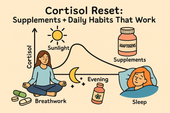
Cortisol Reset: Supplements + Daily Habits That Work
-
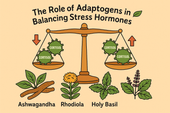
The Role of Adaptogens in Balancing Stress Hormones
Adaptogens work at the root of stress — your nervous system. 🌿 Learn how these powerful herbs help regulate cortisol, calm your nerves, and restore balance between energy and relaxation. ✨
-
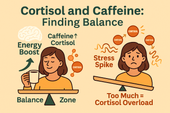
Cortisol and Caffeine: How Much Is Too Much?
Caffeine can boost energy and focus — but too much can overstimulate your stress hormones. ☕ Learn how caffeine affects cortisol, energy levels, and mood, and discover how to find the perfect balance for lasting calm and clarity. 🌿
-
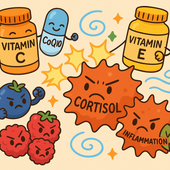
Antioxidants for Stress Management and Cortisol Control
When stress overwhelms your body, antioxidants come to the rescue. 🌿 Learn how vitamin C, CoQ10, and other natural compounds help reduce oxidative stress, regulate cortisol, and restore calm energy from within. ✨
-
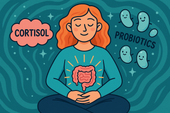
Cortisol and Gut Health: How Probiotics May Help
Chronic stress doesn’t just affect your mind — it changes your gut. 🌿 Learn how cortisol disrupts the microbiome and how probiotics can help restore balance, improve digestion, and calm your stress response naturally. ✨
-

Vitamin D and Cortisol: Supporting Immune Balance
Vitamin D does more than strengthen bones — it helps regulate cortisol and support immune balance. 🌞 Learn how this essential hormone-like nutrient restores calm, improves mood, and strengthens your body’s natural stress defenses. 🌿
-
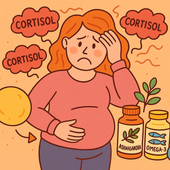
High Cortisol and Belly Fat: Can Supplements Help?
Chronic stress can make belly fat harder to lose — but supplements like ashwagandha, magnesium, and omega-3s may help restore cortisol balance. 🌿 Learn how science-backed nutrients support fat metabolism, calm your stress response, and bring your body back into harmony. ✨
-
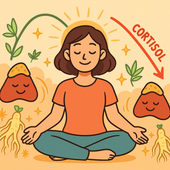
How Ginseng Can Support Energy and Cortisol Balance
Ginseng is one of nature’s most powerful adaptogens, helping your body handle stress without burning out. 🌿 Learn how this ancient root supports balanced cortisol, steady energy, and sharper focus — restoring vitality naturally and sustainably. ✨
-
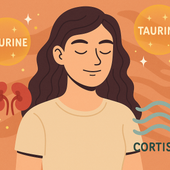
Taurine and Cortisol: Supporting Focus Under Stress
When cortisol surges, focus fades — but taurine helps restore balance. 🌿 Learn how this powerful amino acid calms your nervous system, regulates stress hormones, and sharpens concentration without jitters or fatigue. ✨
-
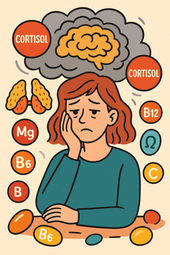
The Link Between Cortisol, Brain Fog, and Nutrient Deficiencies
When brain fog sets in, it’s not just in your head — it’s in your hormones. 🌿 Discover how cortisol imbalance and nutrient deficiencies like low magnesium, B vitamins, and omega-3s can cloud your focus and how restoring balance brings back mental clarity and calm. ✨
-
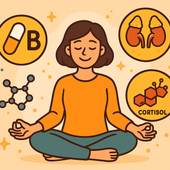
B Vitamins for Stress, Energy, and Cortisol Regulation
B vitamins are the foundation of stress resilience and steady energy. 🌿 Learn how this essential group of nutrients helps regulate cortisol, restore focus, and keep your nervous system calm — giving you balance from the inside out. ✨
-

Cortisol Imbalance and Chronic Fatigue: Can Supplements Help?
When chronic stress keeps cortisol high, fatigue and brain fog follow. 🌿 Learn how to rebalance your stress hormones naturally with calming nutrients, adaptogens, and lifestyle rituals that restore energy, focus, and inner peace. ✨
-

Adaptogen Stacks for Better Sleep and Lower Stress Hormones
Adaptogens can help your body recover from stress and sleep better by regulating key hormones like cortisol and adrenaline. 🌿 Learn how adaptogen stacks work to restore balance, calm the mind, and rebuild resilience — so you can rest deeply and wake renewed. ✨
-

Phosphatidylserine for Nighttime Cortisol Control
When stress hormones stay high at night, deep rest becomes impossible. 🌙 Discover how phosphatidylserine helps calm the brain, reduce nighttime cortisol, and restore healthy sleep rhythms — so you can wake up peaceful, clear, and recharged. ✨
-

Magnesium for Stress Relief and Cortisol Reduction
Magnesium is one of the most powerful natural tools for stress relief. 🌿 This essential mineral calms your nervous system, lowers cortisol, and helps your body recover from chronic tension. Learn how magnesium replenishes balance, improves sleep, and restores inner peace — naturally. ✨
-

Supplements to Improve Sleep by Balancing Cortisol
When cortisol stays high at night, sleep becomes a struggle. 🌙 Discover natural supplements that calm the nervous system, lower stress hormones, and restore your body’s natural rhythm. From magnesium and ashwagandha to L-theanine and phosphatidylserine, learn how to build deeper, more restorative rest. 🌿
-

Cortisol and Sleep: Why Stress Keeps You Awake
When stress keeps your body in fight-or-flight mode, cortisol refuses to calm down — and sleep becomes impossible. 🌙 Learn how elevated cortisol disrupts your circadian rhythm, suppresses melatonin, and turns restless nights into exhaustion. Discover how to restore balance and reclaim deep rest. ✨
-

L-Theanine for Cortisol Balance and Anxiety Relief
L-Theanine — the calming amino acid from green tea — helps quiet the mind and balance cortisol, the body’s key stress hormone. 🌿 Learn how it promotes calm focus, eases anxiety, and supports deep rest without sedation, backed by modern research and centuries of tradition. ✨
-

Rhodiola Rosea and Stress Resilience: A Natural Cortisol Regulator
Rhodiola rosea is one of nature’s most powerful tools for resilience. 🌿 This Arctic root helps balance cortisol, fight fatigue, and sharpen focus — keeping you calm yet energized even under stress. Discover the science behind Rhodiola’s adaptogenic power and how it helps your body thrive under pressure. ✨
-

Ashwagandha for Cortisol Balance: What the Science Says
Ashwagandha helps your body recover from chronic stress by calming the adrenal system and balancing cortisol — your key stress hormone. 🌿 Learn what science says about this powerful adaptogen, how it restores energy and focus, and why it’s one of nature’s most effective tools for modern stress relief. ✨
-

Supplements That Naturally Lower Cortisol Levels
When cortisol levels calm, your energy transforms — no more crashes or jitters, just steady focus and inner peace. 🌿 Learn which natural supplements and habits lower stress hormones, boost calm energy, and help your body thrive with balance instead of burnout. ✨
-

What Is Cortisol Imbalance? Symptoms You Shouldn’t Ignore
Cortisol — your body’s main stress hormone — keeps you alert and energized, but when it’s out of balance, it can drain your health. 🌿 Learn the signs of cortisol imbalance, from fatigue and anxiety to sleep disruption and stubborn weight gain, and discover how to restore calm, energy, and hormonal harmony naturally. ✨
-

The Best Daily Multivitamins for Menopausal Women
Menopause brings new nutritional needs that your old vitamin routine may no longer meet. 🌿 Discover how the right daily multivitamin can boost energy, balance mood, support bone and heart health, and keep your skin glowing. Learn which nutrients truly matter — from vitamin D to magnesium and B12 — to feel strong and vibrant every day. ✨
-

Antioxidants and Menopause: Fighting Inflammation Naturally
During menopause, oxidative stress and inflammation can quietly accelerate aging, fatigue, and skin changes. 🌿 Learn how antioxidants — from vitamins C and E to polyphenols in berries and green tea — help neutralize free radicals, reduce inflammation, and restore balance naturally. Discover the science of radiant, resilient aging. ✨
-

How CoQ10 Supports Heart Health After Menopause
After menopause, heart health becomes more important than ever. ❤️ Discover how CoQ10 — your body’s natural energy molecule — supports cardiovascular strength, restores vitality, and protects against oxidative stress. Learn how this essential nutrient helps keep your heart energized, balanced, and resilient through every stage of life. 🌿
-

Collagen Supplements for Skin and Joint Health Post-Menopause
After menopause, collagen loss affects both skin elasticity and joint comfort — but supplements can help rebuild from within. 🌸 Learn how collagen peptides, vitamin C, and other nutrients work together to restore firmness, reduce stiffness, and keep you glowing and mobile well into your next chapter. ✨
-

Calcium and Vitamin D: Protecting Bone Health in Menopause
Menopause brings hormonal changes that can weaken bones—but with the right nutrients, strength and stability can be rebuilt. 🦴 Learn how calcium and vitamin D work together to protect bone density, prevent fractures, and keep your body resilient. This guide explores nutrition, sunlight, and lifestyle habits that help your bones stay strong and vibrant for years to come. ☀️💪
-

Adaptogens for Energy and Resilience During Menopause
Feeling drained or emotionally scattered during menopause? 🌿 Discover how adaptogenic herbs like Ashwagandha, Rhodiola, and Ginseng can restore energy, balance cortisol, and build emotional resilience. Learn how these natural allies work with your body—not against it—to help you stay strong, focused, and calm through life’s hormonal changes. 🌸
-

Supplements That Help Beat Menopause Fatigue
Menopause fatigue can feel like more than tiredness—it’s a total energy crash. This guide explores how specific supplements, mindful breathwork, and therapy can help restore balance. Learn how nutrients like B vitamins, magnesium, and adaptogens rebuild your stamina, while breathwork and emotional healing calm your nervous system and bring vitality back to your days. 🌿✨
-

Herbal Blends for Menopausal Restlessness: Finding Calm in Transition
Herbal blends bring the wisdom of nature into moments of rest and renewal. Discover how soothing herbs like chamomile, lemon balm, and ashwagandha work together to calm menopausal restlessness, balance hormones, and invite deep relaxation. 🌿💫
-

Magnesium + Glycine for Deep Sleep During Menopause
Nutrients like magnesium, glycine, and B vitamins form the foundation for deep, restorative sleep during menopause. Discover how these natural compounds calm your nervous system, balance hormones, and help you wake up refreshed and recharged. 🌿💤
-

Melatonin and Menopause: Restoring Your Sleep Cycle
Nutrients are the foundation of hormone balance and energy. Learn how vitamins, minerals, and whole foods like greens, salmon, and berries nourish women’s bodies during menopause and beyond — restoring vitality, mood, and strength. 🌿🥗
-

How L-Theanine Helps With Menopausal Anxiety
Science continually deepens our understanding of the human body, from hormones to neurotransmitters. Discover how evidence-based research shapes modern wellness — bridging natural medicine, neuroscience, and hormone balance for healthier living. 🔬🌿
-

Can Ginkgo Biloba Improve Memory in Menopausal Women?
Hormone therapy can be a powerful tool for easing menopause symptoms and restoring balance. Learn how it works, the types available, and how to combine it safely with lifestyle and natural support for optimal well-being. 🌸💊
-

B Vitamins for Mental Clarity During Menopause
Nutrients are the foundation of mental and physical balance during menopause. Discover how vitamins, minerals, and whole foods like leafy greens, fish, nuts, and citrus can fuel energy, clarity, and calm while supporting hormonal health. 🌿✨
-

Mood Swings and Menopause: Natural Nutrient Support
Probiotics do more than support digestion — they help balance mood, hormones, and immunity too. Learn how a healthy gut microbiome can ease menopause symptoms, boost energy, and improve emotional resilience naturally. 🌿🦠
-

Brain Fog in Menopause: Supplements That May Help
Supplements can be powerful allies in restoring balance, energy, and focus—especially during menopause. Learn how nutrients like omega-3s, vitamin D, magnesium, and herbal adaptogens work together to support brain health, reduce stress, and promote lasting vitality. 🌿💊
-

Adaptogen Stacks for Reducing Night Sweats
Hormone detox isn’t about cleansing your body—it’s about restoring flow. Learn how the liver, gut, and endocrine systems work together to eliminate hormone buildup and how herbs like milk thistle, dandelion, and schisandra support balance, clarity, and natural vitality. 🌿💫
-

Cooling Menopause Symptoms with Herbal Support
Ashwagandha is one of nature’s most powerful adaptogens, helping women manage stress, sleep better, and balance hormones naturally. Discover how this ancient root supports calm energy, emotional resilience, and relief from menopause-related anxiety and fatigue. 🌿💫
-

Evening Primrose Oil and Menopause: What the Research Says
Hot flashes are one of the most common—and frustrating—symptoms of menopause. Discover what causes them, why the body’s “internal thermostat” becomes unbalanced, and the natural supplements and lifestyle shifts that can help you cool down, rest better, and feel more in control. 🔥💧
-

How Black Cohosh Helps with Menopausal Symptoms
Sleep disturbances are among the most exhausting symptoms of menopause—but they don’t have to rule your nights. Discover how natural strategies and calming supplements can help you fall asleep faster, stay asleep longer, and wake up feeling truly restored. 🌙💤
-

Natural Supplements That May Reduce Hot Flashes
Hot flashes can disrupt sleep, confidence, and daily comfort—but natural relief is possible. Discover the best research-backed supplements like black cohosh, red clover, and licorice root that may reduce hot flashes, balance hormones, and restore inner calm during menopause. 🌿💫
-

Omega-3s and Menopause: Supporting Mood and Inflammation
Omega-3 fatty acids are essential for hormonal harmony, brain function, and emotional balance—especially during menopause. Learn how these healthy fats reduce inflammation, support heart health, and restore calm, vitality, and focus through every stage of midlife. 🌊💫
-

The Role of Vitamin D in Menopausal Health
Vitamin D plays a powerful role in menopausal health—supporting bone strength, hormone balance, and mood stability. Discover how optimizing your vitamin D levels can improve sleep, energy, and emotional well-being while protecting long-term vitality through every stage of menopause. 🌞💪
-

Magnesium for Menopause: Relaxation, Sleep, and Hormonal Support
Self-regulation is the art of staying calm, centered, and in control—no matter what life throws your way. Learn how to strengthen emotional balance, manage stress responses, and cultivate inner peace through mindful techniques that reconnect your heart, body, and brain. 🌿💫
-

Can Adaptogens Like Ashwagandha Ease Menopausal Symptoms?
Brain fog during menopause can make even simple tasks feel overwhelming—but you’re not losing your sharpness, your hormones are simply shifting. Discover how adaptogens like ashwagandha and key nutrients can restore mental clarity, balance cortisol, and bring calm focus back to your day. 🌿🧠
-

Supplements That Support Hormonal Balance During Menopause
Herbal supplements have supported women’s health for centuries—and modern science is finally catching up. From ashwagandha and maca to red clover and rhodiola, discover how nature’s most trusted herbs can calm stress, balance hormones, and enhance energy through every life stage. 🌿✨
-

The Ultimate Motivation Stack: Supplements That Work Together
Discover how therapy helps restore motivation, focus, and emotional balance alongside supplement and mindset strategies. This empowering article explores how addressing thought patterns and emotional blocks through therapy can complement biochemical tools for long-term drive and well-being. 🧠💬
-

Entrepreneurial Drive: Can Supplements Help You Avoid Burnout?
Entrepreneurship demands energy, creativity, and mental resilience—but without balance, it leads to burnout. This in-depth article explores how nootropic supplements, adaptogens, and mindset tools can help entrepreneurs sustain motivation, manage stress, and keep their drive sharp for the long haul. 🚀💼

















































